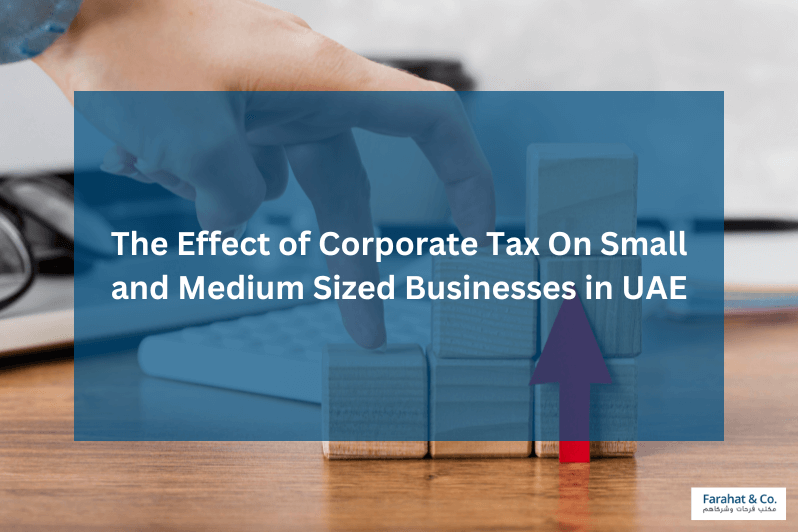Taxes on taxable profits are collected by corporations through corporate income tax. The profit remaining after deducting all expenses permitted by the nation's tax regulations is referred to as taxable income. As a result of the introduction of a new law, Federal Decree No. 47 of 2022, the idea of corporate income tax is currently being discussed in the United Arab Emirates. This law mandates that starting on June 1, 2023, businesses must pay corporate income tax. The Corporate Tax rate by default is 9%. However, businesses are only charged a 0% corporate tax rate on profits up to AED 375,000 annually. The effect of corporate tax on small and medium-sized businesses (SMEs) will therefore be minimal.
Also recently announced by the UAE government is the Small Business Relief program for small businesses. A tax called corporate income tax is imposed on start-ups in order to encourage SMEs to use unrestricted net interest spending in future fiscal years in which the SBR is not chosen.
Corporate Tax's Effects on SMEs: Pros and Cons
The UAE's small and medium-sized enterprise (SME) market is significantly impacted by corporate income tax (CT). SMEs, which support the development of the country, are the foundation of the UAE economy. The introduction of CT has advantages and disadvantages for SMEs in the United Arab Emirates.
- Benefits for SMEs:- With the money generated by Corporate Tax, the government can foster an environment that is advantageous for SMEs. Taxpayers may, for instance, finance the development of SMEs' infrastructure. Additionally, the government can provide grants and subsidies to help SMEs grow and develop.
- Negative effects for SMEs:- Small businesses may experience higher compliance and other administrative costs as a result of CE. Due to this, they are less profitable and competitive. Additionally, because SMEs frequently have a limited budget, Corporate Tax affects their cash flow. SMEs won't be able to expand their operations or invest in new personnel or technologies in this way. The 9% Corporate Tax, however, only applies to gains that are taxable and exceed AED 375,000. This reduces the harmful effects of Corporate Tax. The implementation of SBR will also aid many small businesses in cost reduction.
Salient Provisions Of the Ministerial Decision
- Resident Person:-The only person who is eligible to apply for SBR is a resident taxpayer.
- Minimum Threshold:- The resident taxable entity having combined income for the current tax year and each of the tax years prior to it does not exceed AED 3 million.
- No Relief:-If the turnover in any accounting period exceeds the minimum threshold, a company cannot apply for SBR.
- Application Period:- The turnover threshold of AED 3,000,000 applies from June 1, 2023, to December 31, 2026.
- Extension:-For accounting periods beginning on or after June 1, 2023, but before December 31, 2026, the eligible companies may submit applications for SBR or submit an extension
- UAE Accounting Standard to be Followed:-The income can be calculated using the United Arab Emirates-specific accounting standards.
- Non-applicability:-The small business owner relief is not applicable:-(a). Authorized Individuals in the Free Zone (b). Individuals who belong to multinational enterprise groups (MNE groups),
- Multinational Enterprise Groups (MNE groups), under Ministers Resolution No. 44 of 2020:-As specified in Council of Ministers Resolution No. 44 of 2020 MNEs are businesses with more than AED 3 Million in annual revenue that operates in multiple nations.
- Carry Forward Losses:- Companies may carry forward unrecognized tax losses and net interest expense to future tax years in which SBR was not elected during tax periods in which they did not elect SBR.
- Federal Tax Authority Powers:- If the FTA determines in accordance with the decision that a taxpayer artificially separates their trade or business and makes an SBR claim while their income exceeds AED 3 million, this is regarded as consent to receive CT benefits under the CT Act.
Conclusion
The Corporate Tax may result in higher administrative and compliance costs for SMEs. However, Corporate Tax's revenue streams can be put to good use by developing infrastructure and providing grants and subsidies to SMEs in order to improve their business climate. In addition, the introduction of Small Business Relief (SBR) will benefit numerous start-ups and small micro-entrepreneurs by lessening their compliance costs and tax burden. SMEs must continue to contribute to the development of the UAE economy, stay informed, and utilize any exemptions and relief programs that may be offered. The government's initiatives to support and encourage SMEs, combined with the nation's generally low taxes, make it a favorable location, even though the impact of corporate tax on SMEs in the UAE depends on several different factors.
Read More: BusinessTax Planning Strategies for Small and Medium Sized Enterprises in UAE


